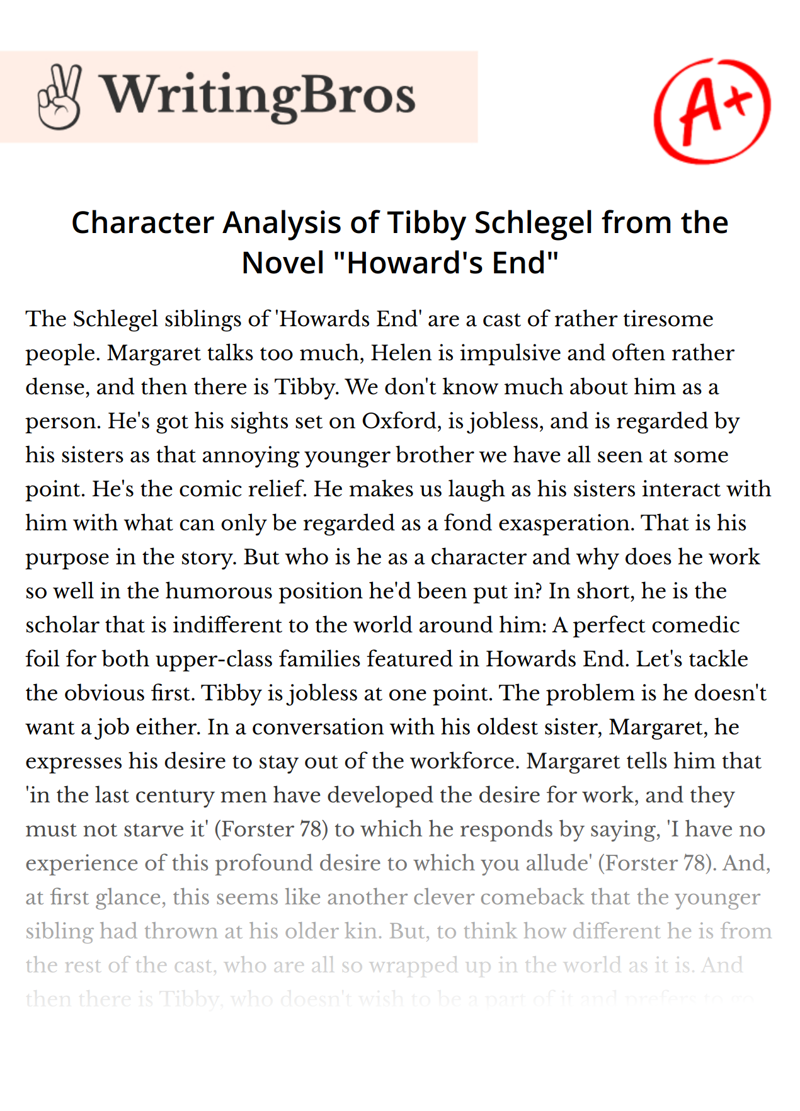Character Analysis of Tibby Schlegel from the Novel "Howard's End"

The Schlegel siblings of 'Howards End' are a cast of rather tiresome people. Margaret talks too much, Helen is impulsive and often rather dense, and then there is Tibby. We don't know much about him as a person. He's got his sights set on Oxford, is jobless, and is regarded by his sisters as that annoying younger brother we have all seen at some point. He's the comic relief. He makes us laugh as his sisters interact with him with what can only be regarded as a fond exasperation. That is his purpose in the story. But who is he as a character and why does he work so well in the humorous position he'd been put in? In short, he is the scholar that is indifferent to the world around him: A perfect comedic foil for both upper-class families featured in Howards End. Let's tackle the obvious first. Tibby is jobless at one point. The problem is he doesn't want a job either. In a conversation with his oldest sister, Margaret, he expresses his desire to stay out of the workforce. Margaret tells him that 'in the last century men have developed the desire for work, and they must not starve it' (Forster 78) to which he responds by saying, 'I have no experience of this profound desire to which you allude' (Forster 78). And, at first glance, this seems like another clever comeback that the younger sibling had thrown at his older kin. But, to think how different he is from the rest of the cast, who are all so wrapped up in the world as it is. And then there is Tibby, who doesn't wish to be a part of it and prefers to go about his days jobless and detached: A foil to both the Wilcoxes and his sisters. And that is what really makes his lines stand out. He's different from the rest of the cast: A breath of fresh air in London.
This brings us a little deeper into the mind of Tibby Schlegel. And for this, we need to go a few pages further, to a small but enlightening conversation about civilization. Tibby proclaims that he wants 'civilization without activity' (Forster 79). He likes the comforts of civilization. He likes the world he lives in. Moving it forward and being an active participant? No. As stated on page 179, it is stated that 'Tibby neither wished to strengthen the position of the rich or improve that of the poor.' Tibby does not have some great vision of the world, nor does he want to work for the sake of working and spending. He's a foil to everything both the Wilcoxes and the Schlegel sisters stand for, as both families are involved with society, while Tibby remains uncaring in comparison. That isn't to say Tibby is completely uninterested in the ways of the world. On page twenty-one, it is revealed that he has a love of music, much like his sisters, and can evidently pick apart a symphony with ease. He plans on going to Oxford, and so, most likely values knowledge. Several years later, he is said to be 'contemplating the Universe' (Forster 179). However, his distance remains, and he continues to be 'untroubled by passions and indifferent to public opinion' (Forster 179). He lives in a bubble, his perspectives limited to only his own. While his sisters seek to find the 'unseen' and the Wilcoxes on the 'seen', Tibby remains passionless, not even finding the need to find something.
To conclude, Tibby Schlegel serves his role as a comedic foil. As a character, he remains the quiet contrast to the Wilcoxes and his sisters, who are both seeking something in the world, with his own indifference to existence. He has his interests - knowledge, music, 'food' (Forster 200) - but often, he has no conclusions nor opinions nor any worries. As he is often in the company of his sisters and the Wilcoxes, his attitude comes across as comedic due to how different they are. After chapters of the Schlegel's idealism and the Wilcoxes' pragmatism, his apathy is laughable, and that is the mark of a great foil.
Cite this Essay
To export a reference to this article please select a referencing style below

